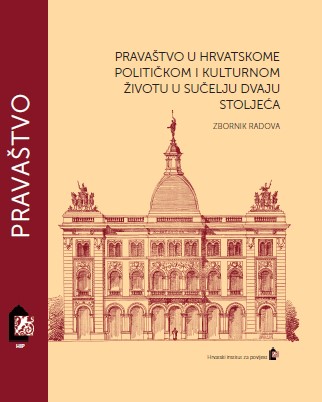Je li Ivo Pilar bio pravaš?
Was Ivo Pilar a ‘Rightist’?
Author(s): Stjepan Matković
Subject(s): Political history, Government/Political systems, Political behavior, Pre-WW I & WW I (1900 -1919)
Published by: Hrvatski institut za povijest
Keywords: Ivo Pilar; ‘Rightism’; Croatian politics; historiography;
Summary/Abstract: Ties between Ivo Pilar and ‘Rightism’ existed at certain historical moments, but from the point of view of his overall ideological profile they were thin. It is hard to establish whether or not he can formally be considered an adherent of ‘Rightism,’ other than that we encounter his name among indirect secondary sources from 1917 and 1918, primarily in certain newspaper articles, where his belonging to the Party of Right is mentioned. As a member of the Croatian National Union he was probably indirectly attached to the Party of Right, that is, towards the end of the First World War, as a member of the circle around the Hrvatski Dnevnik or Stadler’s political group. In any case, we lack the documentary evidence to confirm a formal answer to the question stated in the title, but it is my belief that we should not include Pilar among the ‘Rightists,’ rather we should see him as a prominent individual who during this time period benefitted from his alliance with the ‘Rightists’ due to their complimentary views on the solution to crucial political issues. I am inclined to conclude that Pilar was a rather prolific and influential writer, undoubtedly oriented in favour of Croatian state right, to whom it was clear that despite his personal intellectual abilities he could not independently have a strong influence on the public scene without relying on some party-political organization. Taking into account his familial circumstances and political formation, we can conclude that he was not linked to ‘Rightism.’ The foundation for his evolution was Bosnia and Hercegovina, in which Pilar, like other Croatian politicians from this region, progressively sought out territory on which to cooperate with other prominent parties, and in the first instance this meant from the territory of Croatia-Slavonia, which was the centre of Croatian political life. His assessment of the consequences of the collapse of Austria-Hungary and the predominance of the Serbian factor in the coming Yugoslav formation had a vital impact on his future decisions. In this sense, during this already mature phase of life he leaned toward ‘Rightism’ as the only basis for a wider national movement and an active expression of the desire for independence. ‘Rightism’ was for the most part a natural umbrella for the work of promoting the attitude which made a contribution to overcoming the Dualistic division of the Monarchy, but at the same time an even more pronounced and political basis for opposing certain other ideologies, which strove toward the creation of an integral Yugoslavian state community on the basis of the idea of national oneness. In this direction work toward a combination with ‘Rightism’ took place, but also other Croatian groups and individuals from political life, including the representatives of other South Slav lands, in order to preserve the Monarchy and strengthen its position in South East Europe. Here too Pilar was only one of the protagonists who faithfully believed in the common interests of the Croatian people and the Austro-Hungarian Monarchy, and on the other hand he feared Croatia’s entry into a narrow union with Serbia. It cannot be said that he was unaware of the negative aspects of the Dualist regime because he wrote about these.
Book: Pravaštvo u hrvatskome političkom i kulturnom životu u sučelju dvaju stoljeća
- Page Range: 387-427
- Page Count: 41
- Publication Year: 2013
- Language: Croatian
- Content File-PDF

